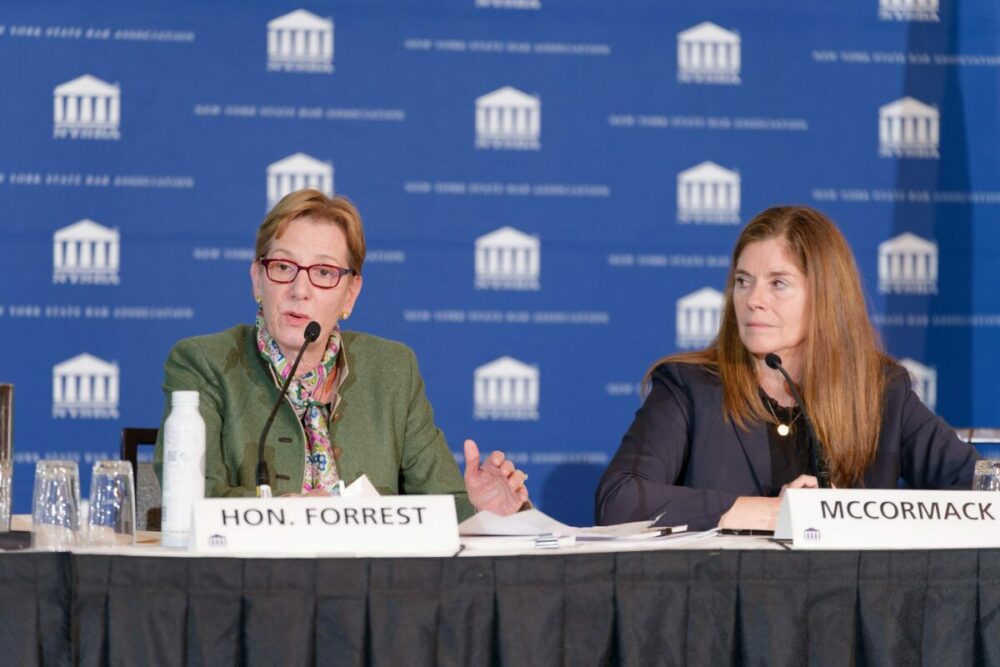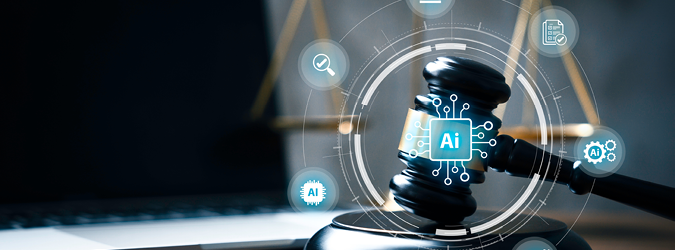Throw Your Strategic Plan Out. AI Is Going To Transform Your Five-Year Plan Into a Three-Month Sprint
1.18.2024

It took Netflix three and a half years to win over one million viewers while ChatGPT took just five days to reach that milestone. Truth is it has been moving at warp speed ever since and will likely have an enormous $200 billion global impact on the economy next year.
ChatGPT has evolved so rapidly since its November 2022 launch that it can now write its own code. Imagine that!
It will change the kind of cases that attorneys handle because AI will be embedded in every single industry. While AI won’t replace attorneys, much of the rote legal work of tomorrow will primarily be handled by AI. A 2023 study by Goldman Sachs estimated that 44% of legal tasks are susceptible to automation, the second highest exposure rate among all the industries that were studied.
Those were among the most fascinating points put forth by a pair of world-renowned panelists who spoke to hundreds of lawyers during the first half of the Presidential Summit, the marquee event of the New York State Bar Association’s 147th Annual Meeting at the Hilton Midtown in New York City.
The summit, entitled “AI and the Legal Landscape: Navigating the Ethical, Regulatory and Practical Challenges,” focused on harnessing the technology that is transforming the practice of law and bringing ethical and regulatory challenges to the forefront of its deployment.
The panel featured Bridget McCormack, president and CEO of the American Arbitration Association and the former chief justice of the Michigan Supreme Court, and Katherine Forrest, partner in the Litigation Department and co-chair of the Digital Technology Group and a member of the Antitrust Practice Group at Paul, Weiss. They engaged in a back-and-forth discussion for nearly 90 minutes.
McCormack and Forrest agreed that AI will leave its mark on everything from long-term planning to billing and even the justice gap. While its propensity to produce errors is a problem for now, Forrest is confident that will soon be solved considering the investment of so much talent and money.
“The practice of law, the business of law and the democratization of legal information are all going to change dramatically and quickly. I think leaders of any organization should be focused now on planning for what this looks like. I always tell courts and other organizations that you have to throw your own long-term strategic plan out the door. You no longer have the ability to plan five years from now. You can for a year, but you’re going to be revisiting it every three months and you’re going to be changing it every three months,” said McCormack.
“We are at the beginning of the beginning of the beginning. We are at a point where we really don’t know in five years what our roles are going to look like; with one exception, it is not going to look like it does today, that I can absolutely assure you. The kind of conversations we are going to be having in five years are going to be incredibly different,” said Forrest.
McCormack also noted that the billable hour will be a thing of the past because various AI tools will allow attorneys to complete tasks at such a quick rate that they will need to develop a new invoicing structure.
There are other challenges with the technology including hallucinations, which are responses generated by an AI tool that contain false or misleading information presented as fact. These outputs are usually attributed to outdated or misclassified data, or biases in the data.
There are other inefficiencies in some A.I. models, which most notably arose in the Avianca case in the Southern District where two attorneys used ChatGPT to draft their legal brief that wound up containing citations that didn’t exist.
“One of the dangers of the models is that they are incredibly persuasive and they really, really want you to believe them, which is its own kind of weird thing,” said Forrest. “The model wanted them to believe these citations were real cases and so it’s kind of a bizarre persuasion, so it’s a hallucination. Now these hallucinations are a real issue that computer scientists are working on today, but there are problems for rolling out these tools for prime time in our profession and a lot of other places, so we have to solve them.”
The Presidential Summit was sponsored by ALM and Anytime A.I.
In an earlier panel, a Business Law Section panel entitled “Artificial Intelligence – Practical Uses of A.I.,” panelists discussed specific AI tools available to the legal profession and the best means to incorporate them into your business practices.
Luca CM Melchionna, chair of the NYSBA Venture and Technology Law Committee, moderated the panel that included Livia Maghiar, head of corporate and technology law and enterprise chief privacy officer, at TIAA, and Vedika Mehera, director of Orrick Lab in Boston.
Maghiar emphasized the importance of engaging various in-house experts when producing policies to minimize risk while using A.I. technology.
“We have a compliance and risks committee with representatives from ethical, we have representatives from data management, we have representatives from data scientists, and we have representatives from legal compliance. It really takes a village to do that and to manage the risks because why we can recognize legal risks and we can recognize client risks, we don’t always appreciate even as lawyers the technological risks that show up, the bogies. It takes different perspectives and different understandings of what you’re building and how it’s being built, including the data points that are being used,” said Maghiar.
Mehera discussed how Orrick is encouraging its employees to use ChatGPT and general-purpose tools while adhering to in-house policies including the type of data employees are allowed to input.
“One of my colleagues uses the analogy that this technology is evolving so quickly, we don’t ever want to be going from the flip phone to the iPhone 13.”






